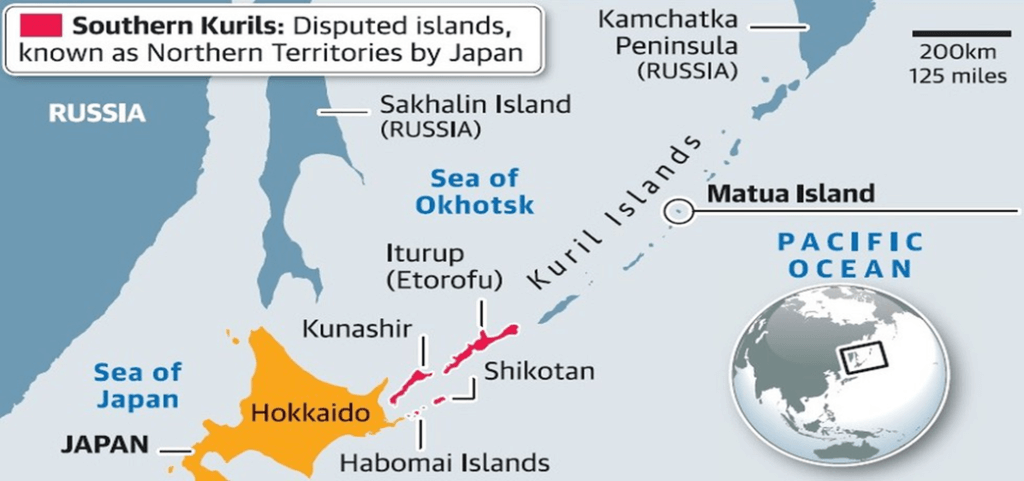Daily Current Affairs : 1-August-2023
The Kuril Island dispute has been a longstanding issue between Japan and Russia, centered on the sovereignty of the South Kuril Islands, comprising Etorofu island, Kunashiri island, Shikotan island, and Habomai island. These strategically located islands have rich fishing grounds, potential offshore reserves of oil and gas, and serve as crucial military outposts for Russia. As the war between Russia and Ukraine persists, conservative voices in Japan are hinting at the possibility of using this opportunity to gain control of the disputed territories.
The Significance of the Kuril Islands:
- Strategic Location:
- The Kuril Islands stretch from the Japanese island of Hokkaido to the southern tip of Russia’s Kamchatka Peninsula.
- They separate the Okhotsk Sea from the North Pacific Ocean, making them important for trade and maritime navigation.
- Geological Features:
- The islands are part of the Ring of Fire belt and house over 100 volcanoes, with 35 being active, along with hot springs.
- These geological features have implications for potential geothermal energy resources and tourism.
- Economic Potential:
- The islands possess rich fishing grounds, supporting the livelihoods of local fishermen and the seafood industry.
- Potential offshore reserves of oil and gas offer economic opportunities for resource extraction.
- Military Significance:
- Russia has deployed missile systems in the Kuril Islands, enhancing its military presence in the region.
- The islands are also considered vital for Russia’s plans to develop a submarine project, which could affect American military operations in the area.
Historical Attempts to Resolve the Dispute:
- Treaty of Shimoda (1855):
- Japan and Russia signed this treaty, granting Japan control of the four southernmost islands, while the rest remained under Russian control.
- Treaty of Saint Petersburg (1875):
- In exchange for control of Sakhalin Island, Russia ceded ownership of the Kuril Islands to Japan.
- Yalta Agreement (1945) and Soviet Occupation:
- The Yalta Agreement formalized the transfer of the Kuril Islands to Soviet Russia, and Japanese inhabitants were deported and replaced by Soviets.
- San Francisco Peace Treaty (1951):
- Japan gave up its rights, title, and claim to the Kuril Islands under this treaty, which did not recognize the sovereignty of the USSR over the islands.
Japan’s Current Approach:
Given the ongoing conflict in Ukraine and the potential implications on regional dynamics, some conservative voices in Japan are contemplating using this opportunity to revive discussions over the Kuril Island dispute. Japan seeks to:
- Reclaim Sovereignty:
- Japan aims to reassert its historical claims to the disputed territories and advocate for the return of the islands.
- Diplomatic Engagement:
- Japan may engage in diplomatic efforts to reopen discussions with Russia and find a peaceful resolution to the dispute.
- Regional Alliances:
- Japan could leverage its relationships with other countries and international organizations to garner support for its claims.

Important Points:
- The Kuril Island dispute involves the South Kuril Islands, claimed by both Japan and Russia.
- The islands are strategically located between Japan and Russia’s Kamchatka Peninsula, separating the Okhotsk Sea from the North Pacific Ocean.
- The Kuril Islands have rich fishing grounds and potential offshore reserves of oil and gas, making them economically significant.
- Russia has deployed missile systems on the islands and plans a submarine project, enhancing their military importance.
- Historical treaties, including the Treaty of Shimoda (1855) and the Treaty of Saint Petersburg (1875), attempted to settle the dispute but were later superseded by the Yalta Agreement (1945) and the San Francisco Peace Treaty (1951).
- The San Francisco Peace Treaty led Japan to give up its rights and claims to the Kuril Islands, which were then under Soviet Russia’s control.
- Conservative voices in Japan view the ongoing conflict in Ukraine as an opportunity to revive discussions on the Kuril Island dispute.
- Japan aims to reclaim sovereignty over the disputed territories through diplomatic engagement and regional alliances.
- A peaceful resolution to the Kuril Island dispute is crucial for regional stability and the equitable utilization of the islands’ resources.
Why In News
As Russia’s invasion of Ukraine continues, certain conservative voices in Japan are speculating that the ongoing conflict might present an opportunity for Japan to assert its claims over the Northern Territories, also known as the Kuril Islands. This delicate situation raises concerns about potential geopolitical implications and calls for careful diplomacy in the region.
MCQs about Unlocking the Kuril Islands’ Potential
- Which islands are at the center of the Kuril Island dispute between Japan and Russia? A) Hokkaido, Shikotan, and Kamchatka B) South Kuril Islands, North Kuril Islands, and Etorofu C) Etorofu, Kunashiri, Shikotan, and Habomai D) Honshu, Sakhalin, and Hokkaido
- What is the significance of the Kuril Islands’ strategic location? A) They serve as vital trade routes between Japan and Russia. B) They separate the Okhotsk Sea from the Atlantic Ocean. C) They are positioned in the Ring of Fire belt, hosting numerous active volcanoes. D) They offer lush landscapes for tourism and agriculture.
- What happened after the Yalta Agreement (1945) regarding the Kuril Islands? A) Japan regained control of the islands. B) The islands remained under Soviet Russia’s control. C) Japan and Russia jointly administered the islands. D) The islands were declared neutral territory.
- Why are conservative voices in Japan seeing the ongoing conflict in Ukraine as an opportunity regarding the Kuril Island dispute? A) They believe Russia will abandon its claims to the islands. B) They aim to reopen diplomatic discussions and find a peaceful resolution. C) They intend to join the conflict on Ukraine’s side and gain support for their claims. D) They want to escalate the tension in the region and provoke Russia.
Boost up your confidence by appearing our Weekly Current Affairs Multiple Choice Questions
![]()


